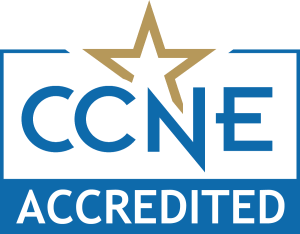DNP Program Overview
The Doctor of Nursing Practice (DNP) program at King University is a practice-focused platform and offers the terminal degree in nursing practice. The DNP offered at King contributes to the expansion of knowledge underlying advanced professional nursing practice. King’s DNP program places considerable emphasis on specific DNP skill development: translation of research into practice, evaluation of interdisciplinary teamwork for performance excellence and dissemination of new knowledge for outcomes improvement. The program was designed using the Essentials of Doctoral Education for Advanced Nursing Practice specified by the American Association of Colleges of Nursing (AACN).
The School of Nursing programs are fully approved by the Tennessee Board of Nursing, and are a member of the American Association of Colleges of Nursing.
Already have a BSN? Take a look at our BSN to DNP Program.

The baccalaureate degree program in nursing, master’s degree program in nursing and Doctor of Nursing Practice program at King University are accredited by the Commission on Collegiate Nursing Education (http://www.ccneaccreditation.org).
The DNP Program consists of:
- Online program with 36 semester hours over six semesters. (Students may elect to progress at a slower pace)
- 1,000 documented post-baccalaureate clinical hours.
As a student in the DNP degree program, one must complete all degree requirements within six years of the first semester enrolled as a degree student.
DNP Program Requirements and Outcomes
Program Outcomes
- Prepare students in a Christian learning environment to become thoughtful, resourceful, and responsible professional nurses with a passion for serving
- Prepare graduates with a scholarly approach to the discipline, with a commitment to the advancement of the profession through the application of research to practice and the ability to translate knowledge to improve outcomes
- Ensure the quality and alignment of curriculum with national and state standards in order to provide eminent learning experiences suitable to the level and role for which the graduate is being prepared
Student Learning Outcomes
- Integrate knowledge from the fields of nursing, biological sciences, psychosocial studies, public health and organizational management to drive improvements in nursing care across diverse populations and settings.
- Plan, implement and lead change strategies across systems to meet the current and future health care needs of patient populations in producing optimal outcomes with a quality focus and fiscal stewardship.
- Translate research findings and theoretical concepts into practice to resolve problems, promote desired change and disseminate new knowledge for the integration of best practices and performance improvement.
- Employ information systems to implement quality initiatives, support best practices, substantiate administrative decision-making and monitor outcomes on the individual, system and aggregate levels.
- Intercede at the systems and governing levels to collaboratively advocate and develop policies to improve health care access, resource allocation, delivery, equity and outcomes.
- Facilitate and/or lead inter-professional teams in the analysis of complex practice and organizational issues to collaboratively create change for improvements.
- Integrate concepts, including cultural diversity, psychosocial dimensions, ethical and Christian standards to promote disease prevention and improve the health of patient populations.
- Demonstrate advanced nursing knowledge and related sciences through the practice of applied interventions, clinical judgment, systems thinking and accountability to improve patient and organizational outcomes.
- All DNP students are required to complete clinical experiential learning hours in order to meet the requirements for the DNP degree. A minimum of 1000 post-baccalaureate clinical practicum hours is required for completion of the DNP program and graduation
- Specific hour requirements may vary for each student based on the number of practicum hours completed in his/her master’s program
- The DNP Project Team Leader will collaborate with the student to develop an individualized plan to meet the goals and achieve the outcomes of the clinical learning experience.
- Submit a completed application for admission to King University (www.king.edu/apply).
- Submit official transcripts of all academic work.
-
- For applicants to MSN-DNP program: A baccalaureate and master’s degree in nursing with a GPA of 3.25 or higher from a program accredited by the Accreditation Commission for Nursing Education (ACNE) or the Commission on Collegiate Nursing Education (CCNE) is required. Other master’s degrees from an accredited university to include but not limited to a Master’s in Business Administration, a Master’s in Public Health, a Master’s in Health Education, or a Master’s in Healthcare Administration will also be considered.
- For applicants to BSN-DNP program: A baccalaureate degree in nursing with a GPA of 3.0 or higher from a program accredited by the Accreditation Commission for Nursing Education (ACNE) or the Commission on Collegiate Nursing Education (CCNE) is required.
- Submit a 300-500 word essay describing the reason for seeking a DNP completed in current APA format.
- Submit a current curriculum vitae demonstrating professional endeavors and accomplishments, education, career, experience, professional memberships, community service/volunteer/military experience and professional scholarly accomplishments.
- Applicants must submit a copy of their current unencumbered Registered Nurse license with privileges to practice in any state where practicum hours will be completed. Applicant should not be on probation and must report any past or current disciplinary action taken by a State Regulatory Board directly to the Dean of the School of Nursing.
- Submit a copy of advanced practice nursing license and specialty certification, if applicable.
- Submit verification of Post-Baccalaureate Clinical and Practice Hours document completed by the candidate’s graduate nurse program if applying to MSN-DNP program.
- Admission exam is not required, but GRE scores may be submitted if applying to MSNDNP program.
- Provide the names and email addresses of three recommenders. At least one should be from a former dean or academic faculty and one from a current or former supervisor.
- May be asked to participate in a face-to-face, phone, or electronic interview with nursing faculty.
- It is highly recommended, but not required, to provide evidence of the successful completion of a graduate level statistics course within five (5) years prior to program matriculation if applying to MSN-DNP program.
King University BSN-DNP Guaranteed Admission Students completing a BSN degree from King University may apply for guaranteed admission to the BSN-DNP program during the final semester of the BSN program. Students applying for guaranteed admission must meet the following admission criteria in addition to those listed above:
- A minimum cumulative undergraduate grade point average of 3.5/4.0 or higher.
- Application must include two academic and one professional recommendation.
- The student will have received no academic sanctions during the BSN program. Guaranteed admission is contingent on time of application and seats available per semester.
Doctor of Nursing Practice Coursework



All Nursing Programs Require:
Laptop computer with Microsoft Office 365, wireless and webcam capability is required. Microsoft Office 365 is available to all King students to load on the PC or Mac and is accessible at Office.com using their King University credentials.